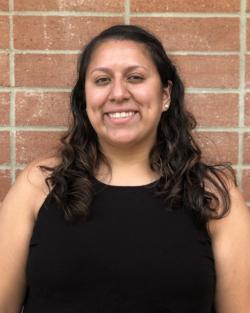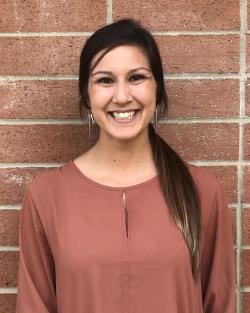2018-2019 Professors for the Future Fellows
Science Outreach: How to Increase the Impact of Your Work
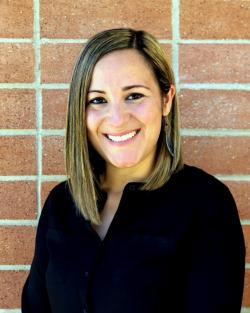
Alexandra Colón-Rodríguez
There are numerous reasons why science outreach is essential for society and the future STEM workforce. Thus, being involved in any form of science outreach is important for scientists, including graduate students and postdoctoral scholars.
With the goal of sharing the importance of science outreach and the ways in which one could get involved with various activities and seek funding, Alexandra and Ayanna organized a three-part workshop, “Science Outreach: How to Increase the Impact of Your Work,” that was developed by Alexandra. The first part of the workshop included discussion of the impact of outreach for scientists, student participants, and the broader community, and tools for how to get involved. The second part of the workshop consisted of a brainstorming activity to help participants develop their own outreach activities. The last part of the workshop included examples of where and how to seek funding and resources to conduct outreach activities. The workshop was a great success with both novice and experienced participants gaining helpful information and expanding their professional network.
While Alexandra and Ayanna hope the success of the workshop will lead to attendees feeling empowered to get involved with outreach and potentially start their own events, they recognize the challenge of planning and executing outreach programming. With the goal of facilitating outreach event creation for graduate students and postdocs to help make these experiences more prevalent in the community, Alexandra and Ayanna edited an outreach handbook, “The Science of Communicating Science with Future Scientists,” that was developed by Ayanna. The handbook outlines all the steps involved in planning outreach, including helpful tips for first-time organizers, advice for creating impactful events, and strategies for ensuring manageability and sustainability, limiting time away from school and research obligations. The handbook is geared towards individuals interested in leading K-12 outreach, but the content could easily be adapted to outreach for all ages and audiences. This document was created in part using information from the “Science Outreach” workshop and was provided to workshop attendees.
The goal of this collaboration was to help attendees learn about different forms of outreach, how they can get involved, and the impact it can have on their careers, the community, or their target population. The workshop in combination with the handbook has provided attendees with information that they can go back to and use for future outreach involvement. Hopefully with these resources more people will get excited about performing STEM outreach, because when there is more outreach, there are more graduate students, postdocs, and community members getting excited about science.
Learn more about Alexandra and Ayanna's project here.
I am First: Navigating Graduate School through a Proactive Mindset
Destiny Garcia and Melissa Patiño Vega
In recent years, there has been a rise in interest in supporting first-generation college students. However, the vast majority of support for this diverse population is seen at the undergraduate level. While supporting first-generation undergraduate students brings innumerable benefits to our campuses and communities, it is equally as important to support first-generation graduate students (FGGS).
The need for awareness and advocacy has sparked interest in the development of the PFTF symposium: I AM FIRST: NAVIGATING GRADUATE SCHOOL THROUGH A PROACTIVE MINDSET.
This collaborative project seeks to provide equitable educational opportunities for all students, and specifically targeting FGGS from diverse disciplines and backgrounds.
Our half a day symposium consisted of a series of workshops and discussions guided by: community counselors, financial experts, faculty from diverse backgrounds, and diverse graduate students.
The Symposium workshops included:
Future Goals for First Generation Graduate Workshops:
We hope to continue to empower FGGS across campus. In the future, we’d like to revitalize the symposium and make this PFTF project an annual event with more on campus support and resources.
Learn more about Destiny and Melissa's project here.
Mentoring Up in HArCS: Developing Mentoring Relationships in the Humanities
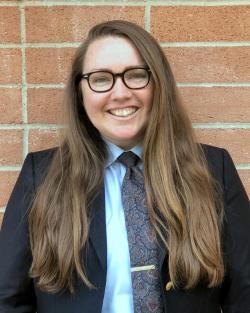
Rebecca Hogue
In May of 2019, I conducted a survey that was sent to graduate students and faculty in the College of Letters and Science at UC Davis to learn more about their expectations of a mentorship relationship. The survey is adapted from work by I Moses, Centre for Learning & Teaching, University of Technology, Sydney and by M Kiley & K Cadman, University of Adelaide (1997). The data set allows us to gauge areas where graduate students’ and faculty expectations for mentorship relationships align and diverge. However, my analysis of the data here focuses on the differences so they might be institutionally addressed.
-
Explaining your work to family and loved ones:
-
Provided personal support for family engagement as graduate students embark on their journey.
-
-
Every Penny Counts
-
Focused on providing financial support, including helping students understand and navigate graduate financial aid, assistantships, as well as internal and external fellowships.
-
-
Mental Health
-
Promoted the importance of mental health and personal well-being. Provided students with tools to work through stressors and provided a stress management technique to help stay grounded and focused in their research programs.
-
-
Real Talk
-
Demystified graduate school through a diverse student and faculty panel.
-
Learn more about Rebecca's project here.
Supporting International Graduate Students: Reducing Barriers to Student Well-Being
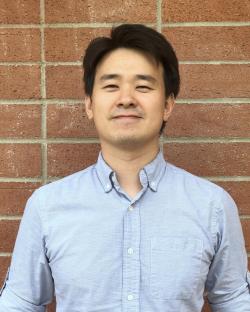
Leonardo Jo
Graduate school can be overwhelming. Graduate students often find themselves immersed in an environment of supervision and competitiveness while having to deal with different aspects of social and financial insecurity. In order to support our community, it is important to hear graduate students’ perceptions on mental-health and what are major stress-related sources that are affecting their well-being. Identifying these stress-related sources will allow us to develop intervention strategies enhance access to mental health support in our university. As part of my PFTF project, I created and promoted an anonymous and voluntary web survey that was distributed to the UC Davis graduate student community. The purpose of the survey was to (1) assess the general mental health status of graduate students at UC Davis, (2) identify common stress-related sources, (3) assess perception and knowledge of on-campus counseling resources and (4) collect suggestions on how we can enhance mental health support services on campus.
The initial step in addressing a problem is to identify it. The results of the survey showed that a large number of participants in the survey (~35%) are showing of signs of moderate to severe anxiety and/or depression. Participants listed the topics that most affect their well-being and the most voted topics were "Research responsibilities or pressures", “Imposter Syndrome”, “Academic Performance” and “Financial/Job Insecurity”. Another stress-related source that showed to be affecting the graduate student well-being is the perception of living an unhealthy work/life balance. The survey also showed that a large number of participants, particularly in the group of students that are showing signs of anxiety and/or depression, never utilized the services provided on campus. When asked for a reason, the most voted category was "I don't have the time” and “I don’t know if it would make a difference”, suggesting a certain disbelief in the services provided on campus. However, the large majority of graduate students who have used the mental health services on campus (~70%) believe that the services provided on campus were VERY HELPFUL or HELPFUL. This information could be used break the disbelief and stigma surrounding the services in our campus. A total of 142 suggestions were submitted on how to improve the well-being of graduate students. All suggestions as well as the results of the survey will be summarized in the final report of the Pilot Survey for Mental Health and Well-being of Graduate Students at UC Davis. This report will be shared with the leadership in our graduate student community. I really hope that this pilot survey can contribute to promote discussions about the mental health condition of our graduate student community.
Learn more about Leonardo's project here.
What Grad School Didn’t Teach Me: Managing Finances in Academia
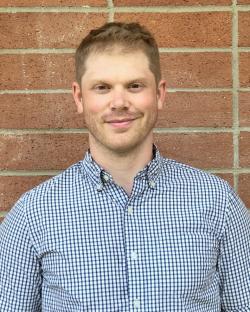
Dovin Kiernan
New faculty are often alarmed by the amount of business know-how they need to successfully start and run a lab. Although many programs exist to teach grad students and post-docs how to mentor, publish, write grants, deliver presentations, and communicate with the public, there are few resources that teach the skills needed to negotiate and manage an academic start-up package – skills that may be a key determinant in the success of new faculty.
This project addresses this gap in training in two phases: (1) ladder-rank faculty were surveyed to better understand the problem and generate strategies for effective negotiation and financial management, and (2) strategies will be disseminated to UC Davis grad students and post-docs. Ultimately, dissemination of these strategies will maximize the success of UC Davis grad students and post-docs negotiating and managing their first start-up.
Learn more about Dovin's project here.
Fostering an Open and Collaborative Research Culture
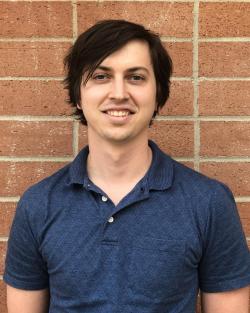
John Mola
Culture dictates success – from sports teams to family units to entire political systems. In lab groups, research programs, or colleges we develop a culture, and in that culture success or failure can be decided wholly independent of the skillset of the individuals involved. This is often apparent in the differences between labs with contrasting cultures, sometimes even right next door. Labs (or any level of organization) with supportive cultures motivate researchers to come to work, to collaborate, to provide feedback, and to advance their shared goals together. In contrast, work environments with toxic or unsupportive characteristics can dampen research interest, slow progress, and ultimately lead to many individuals leaving careers where they may otherwise thrive. This issue can be especially problematic for individuals in underrepresented groups who may already have additional challenges on their career path. This loss of talent affects not only the individuals involved, but our scientific progress at large. Rather than allowing this dysfunction to continue, we should to learn how to become supportive colleagues so we can foster novel ideas and happy, productive researchers.
Lab meetings and seminars are some of the primary ways we come together as colleagues to discuss research and give and receive critical feedback (i.e. develop a research culture!). However, these meetings often occur by “default” with no explicitly stated norms, no guidance on how to structure feedback, and often without facilitators. I addressed this problem in two ways. First, I conducted two surveys: one of faculty asking what skills they believe makes someone a “good colleague” and one of students asking about their access to research support and critical feedback. Next, using the results of the surveys as a guide, I hosted a year-long, weekly “Open Lab Meeting” series which was open to all students, but closed to faculty. In these meetings student-presenters practiced qualifying exams, gave rough drafts of conference talks, and worked on problem-solving tricky analytical challenges. For attendees of the meetings, we worked on developing best practices for giving feedback, facilitating productive discussion, and developed a list of norms to follow in our meetings. The norms, template for how we conducted our meetings, and helpful hints on facilitating groups with no explicit hierarchy are available at OpenLabMeetings.weebly.com
Learn more about John's project here.
The Forbes Files: A Series of Podcasts Featuring Native American Studies Graduate Student Research
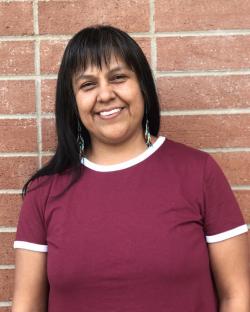
Rachael Nez
During my time as a graduate student, I observed that the interest areas of my colleagues are unique. The topics researched, specific to the Native American communities. For example, a colleague in Native American Studies is pursuing research around heritage language policies. More specifically, she is looking at ways to effectively bridge current US language policies with the language she grew up speaking, the Salish language. Another Native American Studies colleague is taking on the tedious task of interpreting the legalities of the Native American Graves Protection and Repatriation Act (NAGRPA). Another colleagues’ focus pertains to the issues of Native LGTBQIA individuals, examining the problems they face in tribal communities. Native American graduate students given the opportunity, share their research in class and at various academic conferences. However, graduate students hurry through the points of their research, allowing a limited time for the story behind their research. Another challenge of presenting at conferences is financial. Depending on location, presenting at a conference is costly and most times an out-of-pocket expense. Teaching responsibilities are also other challenges that prevent graduate students from sharing their research with a broader academic audience.
With these issues in mind, I produced six podcasts encouraging graduate students to discuss the challenges and the rewards of graduate school. These podcasts are streaming on the podcast sites Libsyn, iTunes, Spotify and on the graduate students website on the UC Davis Native American Studies website. Multimedia tools, like a podcast, reach a broad audience. It educates and inspires. With this PFTF project, I created a digital space for graduate students to share their work. I am inspired by their research and educational journeys and look forward to having more poignant conversations.
Learn more about Rachel's project here.
Mentoring 101: From Introduction to Implementation
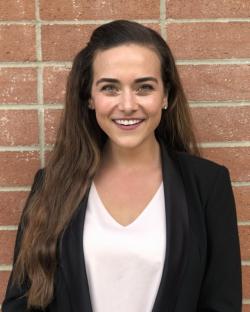
Carlyn Peterson
The “Mentoring 101: From Introduction to Implementation” PFTF Project is a training program for STEM graduate students and post-docs interested in developing their mentoring skills. This project included five workshops in a series that covered a variety of topics integral to mentoring. The workshop titles were as follows: Workshop 1: Introduction to Mentoring, Workshop 2: Selection and Alignment, Workshop 3: Cultivation and Closure, Workshop 4: Experienced Mentor Panel, and Workshop 5: Communicating Your Mentoring Philosophy. A certificate was provided to those mentors who 1) completed 4 out of 5 workshops in the series and 2) completed a survey to assess their skills in mentoring at the beginning of the workshop series (either during workshop 1 or before workshop 2). Workshop materials were sourced and adapted to fit the 5 workshops in the series. Materials included the Entering Mentoring Text, versions one and two, from the University of Wisconsin-Madison and additional Online Mentoring Resources from the UW Institute for Clinical and Translational Research.
Each workshop in the series included participant focused workshop outcomes which allowed participants to walk away with new and improved skills. Workshop outcomes ranged from participants will - Understand the roles and responsibilities of a mentor, - Prepare to establish effective mentoring relationships with mentees, and - Articulate an approach for working with mentees in the future, among others. Workshops occurred for 50 minutes each with majority of the workshop including active learning and participant engagement with the provided materials (readings, handouts, etc). Each workshop ended with a participant survey to gather information regarding the perceived efficacy of the session. After the conclusion of the workshop, participants were added to a Google drive where the information presented during the workshop (Google Slides), handouts, readings, and other associated materials, with the addition of resources not covered, but related to the session, were posted. Over 48 individuals attended one or more workshops in the series and 25 certificates were awarded to successful participants. This training was well received by the participants with an overall satisfaction rating of 97.58%.
Learn more about Carlyn's project here.
Having the Hard Conversations: Equipping Future Managers with the Communication Skills to Successfully Lead a Team
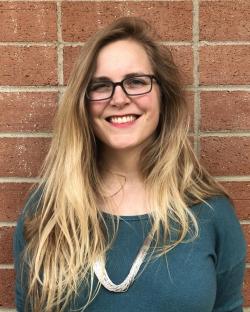
Veronica Prush
As graduate students and postdoctoral scholars, our professional development is focused primarily on expanding the breadth of our knowledge related to our research, refining our teaching abilities, and honing our time management skills. Most of us are preparing for careers in the private sector, academia, or policy, and in all of these fields managerial skills are critical. The transfer of managerial knowledge and techniques in academia is largely unstructured and derived primarily by observing the methods of our advisors. As the expectation is that we will continue our careers in leadership positions, more formalized training in management is crucial. To address the lack of formalized management training, my project focused on developing a seminar for graduate students and postdoctoral scholars that would equip them with communication skills and tools for navigating difficult situations when they arise.
In collaboration with the UC Davis Ombuds Office, I coordinated a workshop focused on conflict management and communication strategies for graduate students and postdocs who are preparing for their first experiences with management. The two-and-a-half-hour workshop had four primary goals: 1) learn to recognize the signs of conflict, 2) understand one’s own conflict styles and identify those of others, 3) learn communication skills to navigate conflict, and 4) workshop a conflict scenario using the tools attendees learned. The Acting Interim Director of the Ombuds Office, Dana Hinojosa, gave the presentation.
The workshop was attended by 39 graduate students and postdoctoral scholars. Feedback received from 29 of the attendees was overwhelmingly positive; all attendees who responded indicated that they would recommend the seminar to their colleagues. Given the success of the workshop and the interest expressed by individuals who were unable to attend the session, I will be working in collaboration with the Ombuds Office and GradPathways to bring this workshop to the graduate student and postdoc community again next year, with the long-term goal of making this a regular professional development offering.
Learn more about Veronica's project here.
Women in STEM Symposium
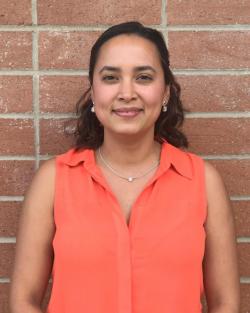
Tania Toruño
Many people struggle when deciding career paths to follow after completing their graduate or postgraduate programs. Thinking about academic jobs in fields typically dominated by men, like science, technology, engineering, and math (STEM) can also be intimidating and overwhelming. The perception of not belonging to or not being able to succeed in STEM academic positions, especially for women and underrepresented groups, is an issue. In order to promote young women to pursue education and careers in STEM fields, I organized a “Women in STEM symposium”. This half-day symposium was a platform for graduate students and postdoctoral researchers to meet and network with seven STEM leaders at UC Davis and the bay area.
Invited speakers included Dr. Colleen Clancy (Associate Vice Chancellor for Academic Personnel and Professor in the Department of Pharmacology, School of Medicine), Dr. Gitta Coaker (Professor and Graduate Program Chair in the Department of Plant Pathology), Dr. Joanna Chiu (Associate Professor and Vice Chair in the Department of Entomology and Nematology), Dr. Pamela Ronald (Distinguished Professor in the Department of Plant Pathology and the Genome Center and Director of the UC Davis Institute for Food and Agricultural Literacy), Dr. Peggy Lemaux(Cooperative Extension Specialist in the Department of Plant and Microbial Biology at UC Berkeley, and faculty lead for UC Berkeley’s CLEAR (Communication, Literacy, and Education for Agricultural Research) project), Dr. Siobhan Brady (Associate Professor in the Department of Plant Biology, and Howard Hughes Medical Institute Faculty Scholar), and Dr. Tracy Richmond McKnight (Director Tobacco-Related Disease Research Program, University of California, Office of the President). Speakers shared their career paths and discussed several topics including: work-life balance, mentorship, mental health, diversity and inclusion, overcoming difficult situations, alternative career options in the academia, and transitioning from academia to industry. The goal was that stories shared by invited speakers and Q&A section would have inspired attendees of the Women in STEM symposium to pursue academic careers in STEM fields.
Learn more about Tania's project here.
We Belong: Exploring Equality, Diversity and Inclusion in Academia
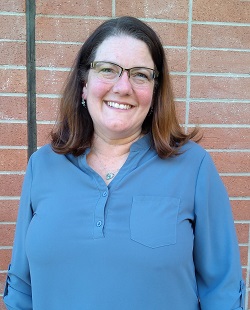 Angela Usher
Angela Usher
“We Belong” is a diversity and inclusion themed podcast series for and about doctoral students and post-doctoral scholars. Within a sound stage where students come to exchange ideas, receive support, and promote a sense of belonging while also discussing barriers to inclusion such as bias and unequal access to resources.
The project was conducted using open-ended semi-structured questions based on broad themes around: diversity and inclusion, dealing with implicit and explicit bias, motivators and detractors from educational pursuit, and inspiration as well as concerns about the current state of higher education and under-represented students.
A total of five doctoral students participated in podcast interviews. Two students were from UC Davis School of Nursing, one student was from UC Davis School of Engineering, one student was from UC Davis School of Native American Studies, and one student was from UC Davis School of Medicine. A sixth student, from UC Davis School of Medicine is scheduled to be interviewed in late May 2019.
All students spoke about being the first in their family to go to college and the theme of what it means to be “first generation college student” was explored. Other themes emerged, including the role of mentoring, building connections with other students and faculty of color, struggling to figure out education systems and financing education, recognizing and addressing bias, imposter syndrome, working with allies, dealing with micro-aggression, and what the university could do to improve diversity and inclusion via random acts of inclusion versus transformative inclusion.
Once complete, the UC Davis Health Office of Equity, Diversity and Inclusion will host the pod casts on their website. A temporary hosting site will house the podcasts and allow them to be heard during the interim. This series of one-on-one recorded podcast interviews will be featured so that students and faculty can access them to explore how other students find motivation, face challenges and respond to bias, and what it means to create better environments for discussing topics related to social justice, equity, diversity and inclusion of under-represented student voices.
I am grateful to the students who volunteered their time to be interviewed, and the UC Davis Professors for the Future program for the experience of a wonderful fellowship and the support to carry out this project.
Learn more about Angela's project here.
The Science of Communicating Science with Future Scientists
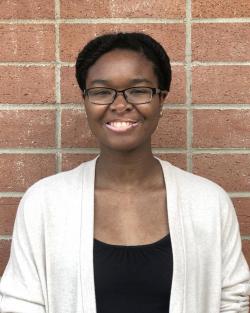 Ayanna Wade
Ayanna Wade
There are numerous reasons why science outreach is essential for society and the future STEM workforce. Thus, being involved in any form of science outreach is important for scientists, including graduate students and postdoctoral scholars.
With the goal of sharing the importance of science outreach and the ways in which one could get involved with various activities and seek funding, Alexandra and Ayanna organized a three-part workshop, “Science Outreach: How to Increase the Impact of Your Work,” that was developed by Alexandra. The first part of the workshop included discussion of the impact of outreach for scientists, student participants, and the broader community, and tools for how to get involved. The second part of the workshop consisted of a brainstorming activity to help participants develop their own outreach activities. The last part of the workshop included examples of where and how to seek funding and resources to conduct outreach activities. The workshop was a great success with both novice and experienced participants gaining helpful information and expanding their professional network.
While Alexandra and Ayanna hope the success of the workshop will lead to attendees feeling empowered to get involved with outreach and potentially start their own events, they recognize the challenge of planning and executing outreach programming. With the goal of facilitating outreach event creation for graduate students and postdocs to help make these experiences more prevalent in the community, Alexandra and Ayanna edited an outreach handbook, “The Science of Communicating Science with Future Scientists,” that was developed by Ayanna. The handbook outlines all the steps involved in planning outreach, including helpful tips for first-time organizers, advice for creating impactful events, and strategies for ensuring manageability and sustainability, limiting time away from school and research obligations. The handbook is geared towards individuals interested in leading K-12 outreach, but the content could easily be adapted to outreach for all ages and audiences. This document was created in part using information from the “Science Outreach” workshop and was provided to workshop attendees.
The goal of this collaboration was to help attendees learn about different forms of outreach, how they can get involved, and the impact it can have on their careers, the community, or their target population. The workshop in combination with the handbook has provided attendees with information that they can go back to and use for future outreach involvement. Hopefully with these resources more people will get excited about performing STEM outreach, because when there is more outreach, there are more graduate students, postdocs, and community members getting excited about science.
Learn more about Ayanna and Alexandra's project here.
Public Communication for STEM Students
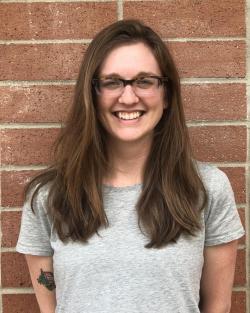 Barbara Wortham
Barbara Wortham
The rapid online consumption of science in the form of blog posts and internet news stories written by all manner of experts means that most Americans have an opinion about many different research subjects. This mass opinion leads to controversy and debate that can impede discourse between certified scientists who work in those fields and the public. My project for the Professors for the Future fellowship sought to bring together a group of skilled science communicators with backgrounds in studying hard science to discuss and provide advice on the skills necessary to be effective science communicators.
The panel discussion included the following panelists: Dr. Zack Valdez, a former AAAS fellow that worked in Washington, D.C. and continues science outreach through an AGU program; Maya Wildgoose, M.S., a high school science teacher from Vacaville High School; Dr. Faith Kearns, a science communicator for the UC Watershed Institute; and Dr. Andy Fell, the associate director of news and media relations at UC Davis. At this discussion panelists discussed the difficult conversations they have had in their roles, how to best approach those conversations, and the changing landscape of discussing science on social media. Panel attendees were allowed to ask questions about their own experiences and how they could better approach difficult problems.
In the elevator pitch workshop that followed the panel, I gave a brief introduction in how to craft and elevator pitch. Then 23 workshop attendees were allowed to practice their elevator pitches with feedback from panel members in small groups, and the panel members were rotated, to provide diverse feedback.
I received mixed feedback on the elevator pitch workshop, with some students noting that group work did not provide the best space for practice of elevator pitches. Overall, however, students said they learned a lot about science communication and what messaging is most effective for them.
“Translating Your Science” was funded by the National Science Foundation Paleo Perspectives on Climate Change program, the Office of Public Engagement and Scholarship, as well as Grad Pathways. Additionally, the broader public had the opportunity to interact with the panel discussion and workshop through Twitter. Undergraduate students Daphne Kuta and Kimberly Bowman volunteered to post updates and receive questions via #TYScience2019.

